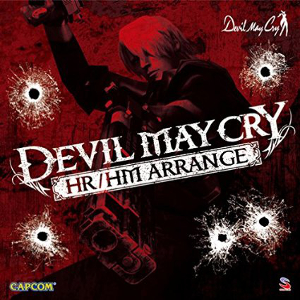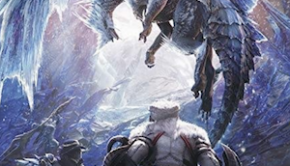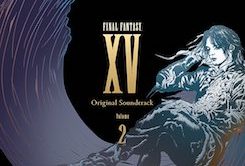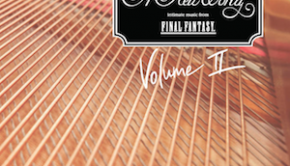Devil May Cry HR/HM Arrange
 |
Album Title: Devil May Cry HR/HM Arrange |
| Record Label: Suleputer |
|
| Catalog No.: CPCA-10388 |
|
| Release Date: August 29, 2015 |
|
| Purchase: Buy at CDJapan |
Overview
While Capcom has celebrated franchises such as Mega Man, Monster Hunter, and Okami with dozens of arranged albums, the similarly musically-rich Devil May Cry franchise remained ignored on this front until now. The Devil May Cry HR/HM Arrange features hard rock and heavy metal renditions of fan favourites from the franchise. There are three arrangements each for the series’ original four games, penned by series’ composers Shibata, Masato Kouda, Kento Hasegawa, Shusaku Uchiyama, Kota Suzuki, and Akihiko Narita. While a great concept, unfortunately the album mostly fails to deliver…
Body
The album begins with a robust arrangement of the series’ very first boss battle theme, “Red-Hot Juice”. Suzuki shifts the electronic fusion sound of the original in favour of a hard rock style in line with later entries in the franchise. Thanks to guest instrumentalist Tadayoshi Makino, the punchy bass lines of the original remain intact and there are some fantastic electric guitar lines. An enjoyable take on the original, it’ll certainly bring back memories of that difficult first encounter with Phantom. However, it also feels a little conservative arrangement-wise — deserving a lot more elaboration at the centre of the arrangement — and would have benefited from a full band performance complete with drums. I also couldn’t help but want to hear the Nelo Angelo and Nightmare battle themes arranged too, perhaps in a medley-of-sorts. Narita’s “Lock & Load” follows suit, a thrashing guitar-heavy expansion on one of the series’ most iconic combat themes. It’s reasonably well arranged and produced, but like most of the material here, could have been much harder and bolder.
While these first couple of arrangements are acceptable, a large proportion of the arranged album takes conservatism to the extreme. Shusaku Uchiyama completely fails to deliver on his arrangements of “Cursed GIANT” and “Heads or Tails”. Both feel like very basic upgrades of the originals rather than fleshed-out arrangements and neither have anything fresh to offer listeners. Amazingly, these takes are both shorter than the originals (a measly 2:32 and 2:56 respectively) and the latter completely omits the ethereal sections that made Devil May Cry 2‘s staff roll so enjoyable. When combined with Kouda’s unremarkable take on “Shoot the Works”, the entire DMC2 section feels tacked on. While undoubtedly the worst game in the series, it still featured a great soundtrack that deserved better arrangements that this. Kento Hasegawa’s take on “Vergil Combat 1” is also disappointing; while effective, the original was certainly dwarfed by its two other variants on the DMC3 soundtrack and this rendition is too shy to make much more of it.
There are a number of vocal arrangements featured too. “Cerberus’ Combat” and “Sworn Through Swords” adhere closely to their originals, combining Shootie HG’s resampled heavy metal vocals with excellently-performed guitar riffs and solos. They’re two of the most enjoyable songs from the entire series, so are fairly welcome nonetheless. More ambitious is “The Theme of Eva”, which expands the one-minute original into a fully-fledged ballad. Though it has its moments, it isn’t of the standard one might hope for from a arrangement and sounds more like a 90s anime theme tune than a well-rounded band performance, with its slightly awkward vocal performance and pop-rock sound. The staff roll themes “Devils Never Cry” and “Shall Never Surrender” also make welcome reappearances courtesy of Tetsuya Shibata. The arranger especially elaborates on the balladic section on the latter, but again the production values aren’t quite as good as they could have been, with some of the new instrumental and vocal additions sounding a little clumsy.
Summary
Overall, the Devil May Cry HR/HM Arrange is pretty disappointing. While the majority of the music is enjoyable enough, the arrangements stay too close to the originals to really satisfy. Many of the instrumental tracks are conservative and formulaic, while the vocal tracks often lack the solid production values typical of the in-game soundtracks. While well-conceived, the album was presumably created on a limited budget over a short timescale. While the Devil May Cry series desperately needs arranged albums, this particular album should have been much, much better.
Do you agree with the review and score? Let us know in the comments below!
2.5
Posted on October 1, 2015 by Chris Greening. Last modified on October 1, 2015.














